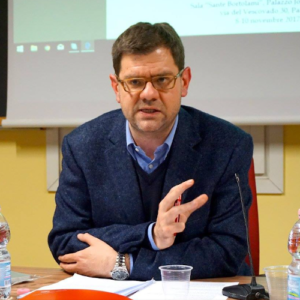Online Lecture
Common Notions
from Plotinus to Iamblichus
November 15, 2023
Lecture will take place on Zoom
7-9pm Athens & Alexandria
6-8pm Paris
5-7pm Oxford
12-2pm New York
Image: Kosmas Xenakis (1925-1984), Composition, before 1965, Oil on canvas, 120 x 120 cm. National Gallery-Alexandros Soutsos Museum, Inv. Number Π.3392
Abstract
According to the Stoics, our cognitive systems are so designed that certain notions arise in every individual and constitute the “common conceptions” which serve as a touchstone (criterion) in argument. This paper shows how Neoplatonist philosophers from Plotinus to Iamblichus integrate the stoic view into their accounts of knowledge. More precisely, Neoplatonist philosophers regard common conceptions as ordinary concepts which arise naturally in humans and reflect basic features of reality (it is controversial whether common conceptions involve inborn cognitive contents). Plotinus and Porphyry furthermore suggest that common conceptions are the same for all humans, while disagreement arises through philosophical enquiry: it is therefore crucial to select those philosophical doctrines which develop common conception adequately and do not conflict with them. Plotinus’ discussion of time in 3.7, Porphyry’s account of knowledge and definition, Porphyry’s and Iamblichus’ discussions about theology provide interesting and under-investigated evidence about these aspects of Neoplatonist epistemology.

Riccardo Chiaradonna (Roma Tre University)
Riccardo Chiaradonna (Rome 1970) is Professor of Ancient Philosophy at Roma Tre University, Rome. His research covers various aspects of Ancient Greek Philosophy: Plotinus, the Aristotle commentators, Galen, Neoplatonism. Among his publications are: Sostanza movimento analogia: Plotino critic di Aristotele (Naples 2002), Boéthos de Sidon: Exégète d’Aristote et Philosophe (Berlin and Boston 2021, with Marwan Rashed), Ontology in Early Neoplatonism (Berlin and Boston 2023).
